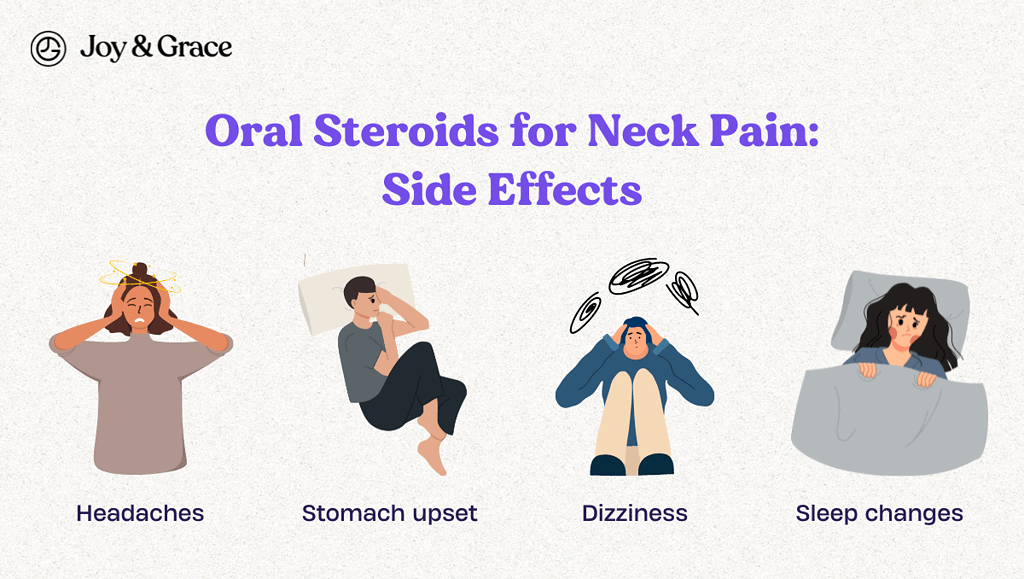Today, we'll explore how the oral corticosteroid prednisone is utilized for two specific conditions: cervical radiculopathy and neck pain related to rheumatoid arthritis. It's important to understand that while prednisone can be effective for these particular causes of neck pain, it may not be the go-to treatment for other types of neck pain. So, let's delve into the details and better understand when and how oral prednisone can provide much-needed relief for these conditions.
Prednisone for Pinched Nerve in The Neck - Does It Work?

Oral steroids such as prednisone are very effective in relieving neck pain caused by pinched nerves.
However, they’re usually not the first line of treatment, as doctors typically recommend rest and non-steroidal anti-inflammatory drugs before prescribing oral steroids. Hence, prednisone is mostly used to relieve more stubborn pinched-nerve pain.
When a nerve in your neck gets pinched, it can cause pain or numbness in your arms and shoulders, making it hard to do everyday things. It can also make your hands, legs, or feet feel tingly or weak. This is often called cervical radiculopathy.
Besides their use for neck pain caused by cervical radiculopathy, another condition oral steroids are used for neck-pain relief is rheumatoid arthritis.
Adult Prednisone Dosage for Pinched Nerve in the Neck (Cervical Radiculopathy)
Doctors usually prescribe 50 to 80 mg of Prednisone daily for five days to relieve pain caused by pinched nerves in the neck.
For example: In a 2013 study of 59 patients with cervical radiculopathy, the researchers reported significant relief in patients' symptoms after a 5-day trial of 50 mg oral prednisone.
After this, the medication is usually taken less and less over the next 5 to 14 days.
As each person is different, the dose and length of any steroid medication depend on your doctor's assessment and the symptoms' severity.
Adult Prednisone Dosage for Rheumatoid Arthritis Related Neck Pain
Prednisone is often added to the treatment plan of sicker people with active rheumatoid arthritis (RA). This is usually done for a short period (less than one month) to reduce disease activity quickly.
Doses for rheumatoid arthritis-related joint issues (including neck pain) are usually between 5 and 15 mg daily. Usually, the dose is based on how sick you are and how much you weigh.
Most of the time, Prednisone starts to work within 1–2 hours. If you've been taking prednisone regularly for over 2 weeks, you shouldn't stop taking it suddenly, or you could get something called adrenal insufficiency. Instead, you should talk to your rheumatology provider about a schedule for tapering off.
Oral steroids such as prednisone are typically used as a bridge until other drugs for rheumatoid arthritis start working.
The correct dose and length of time for any steroid medication will depend on a doctor's diagnosis and the severity of symptoms. It's best to follow the doctor's instructions and contact them if you need to change the dose or don't feel improvement as expected.
You can take oral methylprednisolone with food or milk to keep your stomach from getting upset. For oral methylprednisolone, usage and dosage will depend on what a doctor thinks is best. If you have any questions about the proper dosage for your condition, please talk to your doctor or pharmacist.
Oral Steroids for Neck Pain: Side Effects

Oral steroid medication is usually given in short durations and measured doses. The reason for this is to try to prevent side effects. Still, like any other medicine, taking prednisone for neck pain or a pinched nerve can cause side effects. Some of these include:
- Headaches
- Stomach upset
- Dizziness
- Sleep changes (insomnia)
Some serious adverse reactions can also occur when taking oral steroids, such as:
- Difficulty of breathing
- Swelling of the face or throat
- Skin rashes
- Fainting or loss of consciousness.
If there are serious side effects after taking medication, seek medical attention immediately.
Because steroid drugs act like natural hormones, using them for a long time or too much can also change how the body typically works. Some known effects of long-term steroid use are:
- Elevated blood pressure levels
- Bone loss (osteoporosis)
- Cushing's syndrome
- Adrenal gland suppression
Keep in frequent touch with your health care provider to ensure your treatment with steroids stays on track and your recovery moves in the right direction.
How Oral Steroids Work
Steroids are a class of drugs that reduce inflammation. They are similar to the hormones our bodies naturally make. When taken, one thing they do is signal the body's immune system to relax and turn down the signals for pain and swelling. This makes the process of healing more comfortable.
There's plenty of evidence that steroids are strong and effective. They treat arthritis, asthma, skin problems, and some allergic reactions. Methylprednisolone and prednisone can help ease neck pain caused by pinched nerves or rheumatoid arthritis and increase the range of motion of affected muscles.
Steroids are usually only used for a short amount of time. Using steroids too much and for too long can cause weight gain, osteoporosis, and cataracts.
What Drugs, Substances, or Supplements Interact with Oral Steroids?
Oral steroids are known to interact with some drugs, substances, and supplements.
Among them are:
- Anticoagulants (blood thinners)
- Insulin and other diabetes medications
- Aspirin (antiplatelet medications)
- Nonsteroidal Anti-inflammatory Drugs (NSAIDs)
- And Immunosuppressant medications, among others.
Additionally, if you have been taking steroids for a long time, some types of vaccines might not work as well.
Before you take prednisone or methylprednisolone, list all the other medicines you are on. Talk to a doctor before beginning any medication, especially those listed above.
Who Should Take Oral Steroids
Oral steroids are anti-inflammatory medications taken by mouth. Doctors use them to treat allergies, asthma, eczema, and arthritis, among other things. Oral steroids may also be a good choice for people recovering from injury and surgery.
Cervical radiculopathy and neck pain from rheumatoid arthritis are two types of neck pain that can improve with oral steroid treatment.
What Is Cervical Radiculopathy?
A common cause of neck pain is a "pinched nerve" in the neck, also called cervical radiculopathy.
Cervical radiculopathy occurs when a nerve in the neck becomes pinched or irritated, leading to neck pain that radiates to the shoulder and arm.
The most common cause of cervical radiculopathy is a disc herniation in the neck. This happens when the soft inner portion of a disc pushes through a crack in the outer ring, exerting pressure on the nearby nerves.
Other potential causes include:
- Degenerative disc disease,
- Spinal stenosis (narrowing of the spinal canal),
- Bone spurs, or
- Cervical spine injuries.
These factors can contribute to nerve root compression, resulting in the characteristic symptoms of pain, tingling, numbness, and weakness. Identifying the underlying cause of cervical radiculopathy is important to determine the most appropriate treatment approach. Consulting a healthcare professional can help diagnose the specific cause and provide targeted interventions for relief.
What Are the Symptoms of Cervical Radiculopathy?
If nerves in the neck are pinched, inflamed, or hurt in some other way, the symptoms will depend on the type of injury. Cervical radiculopathy, in particular, can cause neck, shoulder, and arm pain. It can also make one specific side of the affected limb feel numb and tingly.
When you have cervical radiculopathy, doing simple things like combing your hair or driving can be challenging. In severe cases, it can lead to paralysis of the arms or legs.
How Do You Diagnose Cervical Radiculopathy?
A doctor can tell if you have cervical radiculopathy by examining your symptoms and giving you a physical exam. Magnetic resonance imaging (MRI), Computed tomography (CT) scans, or other tests (such as nerve tests) may also be ordered to confirm the diagnosis. Speaking to a doctor or healthcare team is best to determine if your pain and other symptoms are due to cervical radiculopathy.
Does Cervical Radiculopathy Require Surgery?
The main management plan for cervical radiculopathy focuses on getting rid of the pain and discomfort it causes. Treatment options depend on the severity of the symptoms. Initially, doctors may suggest rest, ice, heat, physical therapy, and over-the-counter pain medication. A doctor may recommend more treatment, like steroid injections if the symptoms don't diminish.
Sometimes, surgical intervention is needed to take the pressure off of the nerve. But with conservative treatment, many people with cervical radiculopathy will feel better.
Takeaway
In conclusion, prednisone can be an effective treatment option for relieving neck pain caused by a pinched nerve, such as cervical radiculopathy, and neck pain associated with rheumatoid arthritis. However, it is important to follow a healthcare professional's recommended dosage, duration, and guidance to minimize potential side effects and ensure safe and effective use.
Tell us about how you cured your neck pain in the comments below, and have a look at our other health articles!















